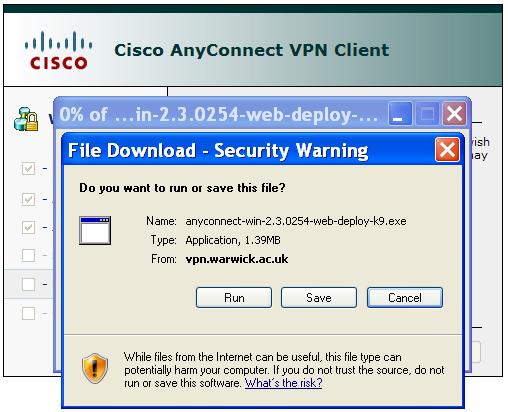

OpenConnect is a cross-platform multi-protocol SSL VPN client which supports a number of VPN protocols:
- AnyConnect Support for Linux. Cisco AnyConnect Secure Mobility Client 4.0 supports the following versions of Linux operating system: - Red Hat 6 (64-bit) - Ubuntu 12.x (64-bit).The AnyConnect GUI is not supported on all Linux distributions. When the GUI is supported, it's appearance is the same as the AnyConnect version 2.5 GUI.
- Windows 7 systems benefit from using the full set of NTP servers, but cannot be configured to obtain NTP server information from DHCP. Because the control panel does not allow setting multiple servers, settings on these systems must be verified and changed from a command prompt.
- An openconnect VPN server, which implements an improved version of the Cisco AnyConnect protocol, has also been written. OpenConnect is released under the GNU Lesser Public License, version 2.1. Development of OpenConnect was started after a trial of the Cisco AnyConnect client under Linux found it to have many deficiencies.
- Cisco Anyconnect VPN client for Linux I looked at the instructions for installing the VPN client located here and it says that I can download the Anycast VPN client for Linux here. The problem is when I go to the link the only downloads that are available are for Mac and Windows.
- Cisco AnyConnect (--protocol=anyconnect)
- Juniper SSL VPN (--protocol=nc)
- Pulse Connect Secure (--protocol=pulse
- Palo Alto Networks GlobalProtect SSL VPN (--protocol=gp)
- F5 Big-IP SSL VPN (--protocol=f5)
- Fortinet Fortigate SSL VPN (--protocol=fortinet)

AnyConnect Profiles XML and profile files are stored locally to the users machine. The location varies based on OS.
Fedora Cisco Anyconnect Windows 10
OpenConnect is not officially supported by, or associated in any waywith Cisco Systems, Juniper Networks, Pulse Secure, Palo Alto Networks, F5,or Fortinet, or any of the companies whose protocols we may support in the future.It just happens to interoperate with their equipment. Trademarks belong totheir owners in a rather tautological and obvious fashion.
An openconnect VPN server (ocserv), which implementsan improved version of the Cisco AnyConnect protocol, has also beenwritten.
OpenConnect is released under the GNU Lesser Public License, version 2.1.

Motivation
Development of OpenConnect was started after a trial of the Cisco AnyConnectclient under Linux found it to have many deficiencies:
Cisco Anyconnect Vpn Client Download
- Inability to use SSL certificates from a TPM or PKCS#11 smartcard, or even use a passphrase.
- Lack of support for Linux platforms other than i386.
- Lack of integration with NetworkManager on the Linux desktop.
- Lack of proper (RPM/DEB) packaging for Linux distributions.
- 'Stealth' use of libraries with dlopen(), even using the development-only symlinks such as libz.so — making it hard to properly discover the dependencies which proper packaging would have expressed
- Tempfile races allowing unprivileged users to trick it into overwriting arbitrary files, as root.
- Unable to run as an unprivileged user, which would have reduced the severity of the above bug.
- Inability to audit the source code for further such 'Security 101' bugs.
Naturally, OpenConnect addresses all of the above issues, and more.
New protocols
Adding new protocols to OpenConnect is relatively simple, andadditional protocols have been added over the years since usingOpenConnect allows a developer to concentrate on the protocol itselfand most of the boring details about platform-specific tunnel managementand IP configuration, and handling of client SSL certificates, are alreadyresolved.
If you have a protocol which you think it makes sense to support inOpenConnect, especially if you are able to help with interoperabilitytesting, please file an issuein GitLab.
Consistent multi-protocol support
Cisco Anyconnect Download
Wherever possible, OpenConnect presents a uniform API and command-lineinterface to each of these VPNs. For example,openconnect --force-dpd=10will attempt dead peer detection every 10 seconds on every VPN thatsupports it, even though the actual mechanism used may be protocol-specific.Protocol-specific features and deficiencies are described on theindividual protocol pages.
